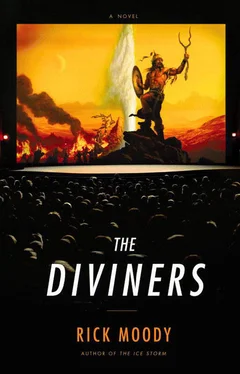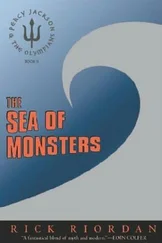“Come back again soon!” He waves. “And when you develop the harpsichord story into a script, think of us.”
“You bet I will!”
Once Vic Freese has decided upon that habit of highly effective talent agents known as deceit, of which expedience is one substrategy, he realizes that everything is quieter than he expected. There’s a recess of autovilifications in his skull, the voice that says too short, the voice that says too wimpy, the voice that says too passive, the voice that says too soft. All of these voices sound remarkably like various heads of departments at the Michael Cohen Agency, but they have all gone on smoke break with the global conspiracy of cigarette smokers, and here he is sitting on the couch, opening the envelope, in an HVAC silence where there is only the faintest stirring of oxygen pumped into the stillness of reception. Sandra call-forwards in a murmur.
He likes the title, The Diviners, and he likes the fact that the treatment calls for not one but three separate films. Three films, to be filmed at once, in locations all across the globe, and thus with sequels built in. A franchise. A branding opportunity. He likes it. He likes the ambition of the franchise. He likes that there are dozens of protagonists. He likes that every single race, religion, and ethnicity he can think of is in the project. He likes that the story has Hungary in it, actually, because he is partly Hungarian (his grandmother’s mother). He likes the Gobi Desert. He likes exotic settings. There’s a little scene about the conflict in the Falklands. He likes it.
In fact, The Diviners seems made to order for Vic Freese because his taste is old-fashioned. He recently attempted to watch that television show where young people are thrown together in a house in Boston or is it Austin, where they talk in direct address to the camera about the one guy who doesn’t want do the dishes, and this guy’s a bleeping bleeping bleep, et cetera. He has no patience for this kind of thing. He tried watching the game show about people who want to be millionaires. He has no aptitude for this. He believes Regis Philbin is a cloning experiment gone horribly wrong and that the introduction of Regis Philbin and his hair into the larger genetic pool will result in global calamity. Vic has tried to go to the movies at the little art houses, after work, but he hates independent films. He thinks independent film people smoke too much pot. And anyway there is no such thing as independent cinema anymore, it’s a farm team for the big leagues, which is why he dislikes Vanessa Meandro, besides the fact that she sweats too much. She thinks she’s better than him.
Vic’s formative moviegoing experiences were epics. CinemaScope types of things. Deserts, world wars, voyages in outer space, biblical stories, dragons, armies of spear-throwers, stop-motion. These are the kinds of stories Vic Freese likes, the kind where it takes a year to film and there are calamities of fire and ice. The kind of films where extras lose limbs and entire villages have to be burned to the ground. Like The Diviners.
Based on a novel by Margaret Howe Hinckley Firestone. Must be a real name because it’s so awful. It’s like she killed off half a dozen husbands with poison-laced tureens of soup and kept all the names. Hey, wait. Didn’t she write the fourth sequel to Gone with the Wind ?
It’s really good. It’s really, really, really, really good. It’s fresh. It’s fantastic. It’s the best treatment he’s read in a year. It’s big, it’s subtle. It’ll make you laugh. It’ll make you cry. It’ll make you leave the theater and throw up your arms in joy and kiss your best friend’s wife. It’ll make you want to sit and think for an hour. It’ll make you want to call a friend and tell her all about it. It’s a film for women because it has love in it. It’s a film for men because it has war. It has the man-versus-nature theme that’s so important according to a teacher he had in the ninth grade. It’s a movie of such potential that it can’t help but give Vic Freese another idea, and he’s on a real streak this morning with the ideas. This additional idea is even better than the idea about reading the contents of the manila envelope: The new client would make a really good Nurit. Nurit is a character in The Diviners, the Jewish daughter of the shopkeepers in Budapest who falls in love with a Gypsy boy, Babu. A star-crossed-love kind of thing. What could be better? He can see her, with a dark wig on, wearing some kind of torn shirt, the curve of her silicone-enhanced C cup just visible beneath. Her pierced navel will come in sort of handy, too. She and her lover and her family will flee across the Caspian Sea on a raft. Her belly is perfect. Nurit, the devoted and pure daughter of the shopkeepers. Nurit will wash away the bloody public relations stain of Ramon Martinez.
Vic Freese gets up from the couch in the sweet calm of reprieve. He goes upstairs to visit the kids in photocopy.
That afternoon, Jeanine gets the order she’s been dreading all day: Go deal with the Indian guy. He’s in the empty office. No one wants to go in there.
Vanessa definitely won’t go because Vanessa signs the checks. Madison won’t go because she had to do these errands for two years. Once you’re relieved of that responsibility, you work hard not to go back. Annabel won’t go because there’s this general hesitation about asking her to do any menial task. Thaddeus won’t go because he’s a movie star. His idea of gallant is trying to persuade you that you should go to his nephew’s school play in his place. Ms. DiNunzio won’t go because she’s the accountant. Her desk is spotless.
That leaves Jeanine. The Indian guy has had the door closed all day. You can hear him chanting. Shiva must be a melancholy deity, if the chant is any evidence. Thaddeus makes jokes about it because he seems to want Jeanine to sleep with him again. But she’s not doing it. After she sleeps with him she just goes back to the apartment that she shares with her girlfriend from college and she does her laundry. The transition from love to bleach is too violent. Thaddeus never returns her calls, and then he kisses the air by her cheek and explains about Shiva the destroyer, and that’s supposed to be enough.
Movie executives are aroused by people without power. Read any manual. Everyone is turned on by the girl with nothing. Tenderness offered to the assistant ennobles he who offers. Doesn’t matter if you abuse the girl for weeks at a time, doesn’t matter if you make her use the plumber’s helper to unplug the ladies’ room down the hall. If you are nice to her for three minutes on her birthday, you are golden.
Vanessa comes out of her lair and steals a doughnut from a new bag. Vanessa waves in the direction of down the corridor. “Get your butt down there and see if Ranjeet is comfortable and has everything he needs.”
It’s because she’s younger. It’s because she’s from the Southwest. It’s because of the disfigurement. They feel pity for her because of the disfigurement, and then they treat her even worse. That’s their kind of pity.
A cheap composite-wood door with a hollow core. This is what separates the chanting from the rest of Means of Production. She knocks tentatively. Siva yeah, Siva yeah, Siva, Siva, Siva yeah. Or that’s how it sounds. She knocks again. She can hear him shifting in the space. At last, Ranjeet opens the door. Just wide enough for his face to appear in it.
“I’m supposed to come in here and help,” Jeanine says. “Do you need help with anything?”
“What is it that you need help with?”
“I don’t need help,” Jeanine says. “I’m supposed to help you.”
Читать дальше












